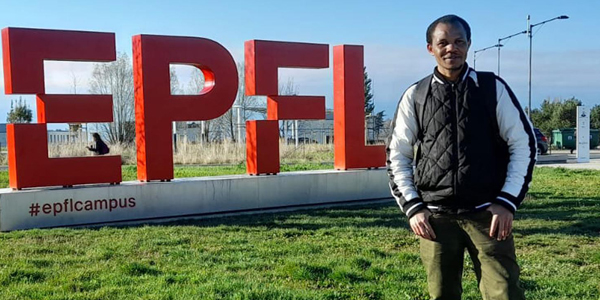Witsie awarded prestigious scholarship
- Wits University
Geoffrey Mwendwa, a PhD candidate in Physics, secures one of the initial spots in the 100 PhDs for Africa Programme (EXAF).
EXAF, the Excellence in Africa Initiative, is a collaboration between EPFL, the Swiss Federal Institute of Technology in Switzerland, and UM6P, Mohammed VI Polytechnic University in Morocco. The 100 PHDs for Africa Programme aims to create conducive conditions for exceptional PhD research.

Mwendwa, a physicist born in Kenya with expertise in multiferroic materials, stands as one of only two PhD candidates from South African universities. He will benefit from financial support, co-supervision by an EPFL professor, and participation in summer/winter schools organised by UM6P. (Read an interview with Mwendwa.)
The objective of the 100 PHDs for Africa Programme is to foster an environment for the candidates to produce outstanding PhD research.
Mwendwa’s PhD research seeks to induce strong ferroic correlations in materials (multiferroics), potentially leading to the development of an innovative generation of devices characterised by high efficiency, low energy dissipation, and high storage density, among other advanced capabilities.
“Imagine a material that can lead to the creation of ultra-fast, high-energy-efficient, high memory storage density, and portable electronic/electrical devices. These high-end device capabilities are the hallmark characteristics of the next-generational technology. Our research seeks to induce such properties in multifunctional materials known as multiferroics by engineering strong ferroic correlations. Strong ferroic correlations are predicted to provide novel physical properties (such as spin and charge frustration, which can bring a paradigm shift in technologies like spintronics to replace electronic devices, 4-state memory storage to replace binary memory storage, magnetoelectric batteries to replace electric batteries, solid-state refrigeration to replace compression/expansion cooling cycle-based refrigerants, magnetoelectric photovoltaics to replace semiconductor solar cells, etc.).”
The Programme also aims to cultivate a new generation of talented young researchers in Africa and nurture excellence within the continent's academic sector.
“I feel incredibly honored to be among the first candidates to be accepted into the EPFL-UM6P EXAF 100 PhDs for Africa Programme. This is indeed a golden opportunity for me to exploit my potential in academics and research in fullness. I am confident that I will be able to make a significant contribution to the search for materials that can deliver for the next generational technology.”
Africa's growth has been accelerating in recent years, necessitating an increasing demand for highly educated researchers in science and technology across the continent. The substantial interest shown in the 100 PhDs Programme throughout Africa, with more than 850 applications received in the first selection phase, underscores this need.
Follow EPFL on LinkedIn to be informed of the next call for projects.
- This work is sponsored by the 100 PhDs for Africa Programme under the UM6P – EPFL Excellence in Africa Initiative.

